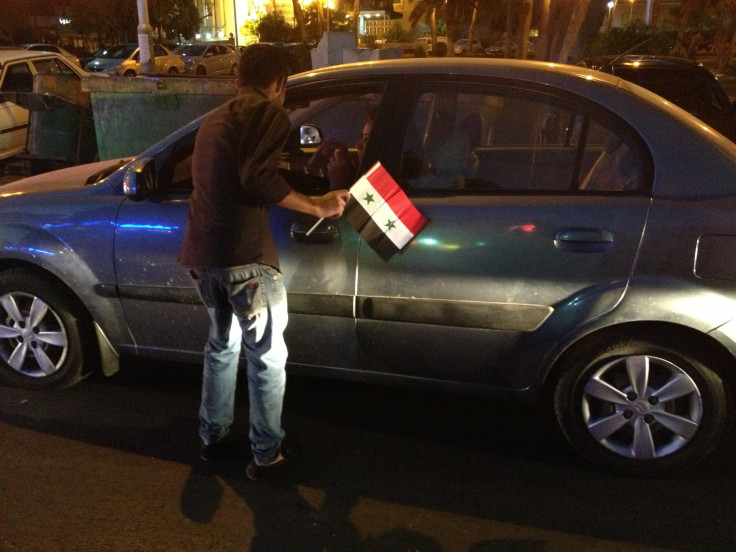Spared For Now From American Missiles, Damascus Rejoices. Or Does It?

DAMASCUS, Syria -- Patriotic music blared as young supporters of the Syrian regime disrupted traffic and gave out candy and small cookies to drivers. Some cars honked in agreement, and drove off blaring their own patriotic tunes. On the sidewalk, people sat at an outdoor cafe smoking hubbly-bubbly and applauding.
Such was the scene in one Damascus neighborhood early Wednesday evening, as people rejoiced over the latest development on the international arena. U.S. President Barack Obama agreed to give diplomacy a chance at Moscow’s suggestion, thus delaying a military strike against Syria, possibly indefinitely.
“I’m so happy. Our country will be fine after all,” said Najwa, 25.
Wednesday, Sept. 11, also happens to be Syrian President Bashar Assad’s 48th birthday.
But beneath the veneer of celebration lurked a melancholy unshakable these days from the terse faces of Damascenes.
Indeed, most of those celebrating in the street were not even from Damascus. They were young men, many of them state security in civilian clothing, almost all from out of town, probably from Alawite and other loyalist villages in far-off provinces.
Alawites are the members of a Shia Muslim minority sect to which the Syrian regime belongs. Syria’s rebels, on the other hand, are predominantly Sunni Muslim, reflecting the country’s majority-Sunni demographic.
But just because the U.S.-led strike is no longer imminent, that does not mean life for Syrians has reverted to normal. Far from it.
I was reminded of this earlier on Wednesday, when I ran into a young couple I had not seen since early May. Amer and Razan were on their way to the hospital to visit an in-law who had given birth that morning.
“It’s a girl,” said Razan. “C-section after seven hours of labor.”
I persuaded them to join me at home for some misk-flavored Arabic ice cream, a delicious local treat and, I thought, an appropriate celebration for the birth of their niece. They obliged.
But no sooner we got to chitchatting in my living room that I began to notice something was wrong. Razan and her husband seemed unusually stoic. They struck me as slightly paler, slightly more nervous, less humorous, than when I last saw them.
Nonetheless, they showed me pictures of their own daughter on their mobile phones and gave me her latest news.
“She just turned 1,” Amer said.
Still, I could not understand why Amer, who sat cross-legged, was shaking his top foot so nervously. It was not like him. Nor did I get why Razan appeared so detached.
It was what came next that finally explained it all. Sad and shocking news, that I think captures so much of what life in Syria has become, regardless of -- and despite -- talk of a U.S. military strike.
Almost in passing, Razan said:
“Well, as you might know my brother was martyred four months ago today.”
I didn’t know. And I was upset to hear the news.
Apparently, at the age of 28, he had been called up as an Army reservist only weeks before he was killed.
“We told him to flee the country, but he insisted on answering the draft order. He felt duty-bound,” said Razan, who like her husband and brother never embraced Syria’s uprising. But like any typical Syrian family, both Razan and Amer have other family members who staunchly support the rebels.
I did not know Razan’s brother, so this was not a personal loss to me. But the news hit home because Razan’s “martyr” could have been any one of my young, male relatives, just as he could have been the killer of any one of the rebels I have come to know and respect.
Indeed, like thousands of Syrian young men, three of my close relatives have fled their draft orders and left Syria altogether. They did so not only to escape the fate of Razan’s brother, a likely outcome given the minimal military training and support that Syrian reservists end up getting these days, but also to conscientiously object to the civil war.
One cousin, currently unemployed and destitute in Lebanon after fleeing his military orders in Syria a few weeks ago, put it like this:
“One time, I almost ran over a cat while driving, and I thought about the cat for days and nights afterward,” he said. “Imagine if I ended up going to the Army and shooting a man!”
Other cousins fled their military orders because they support the rebels, and could never allow themselves to serve a regime they hate so much.
“I’ll die of hunger in exile, but I’ll die with dignity,” one cousin told me before going to Egypt.
For now, a U.S. military strike against Syria seems unlikely. But bar a fleeting sigh of relief and a forced celebration in the streets of the capital, very little has changed.
Syrians still live their lives day to day, seeking out little signs of hope, like news of a healthy newborn in the family. Yet always, they are bracing for the more common and more likely news of loss and tragedy.
© Copyright IBTimes 2024. All rights reserved.











